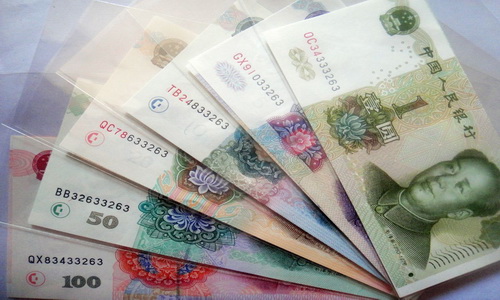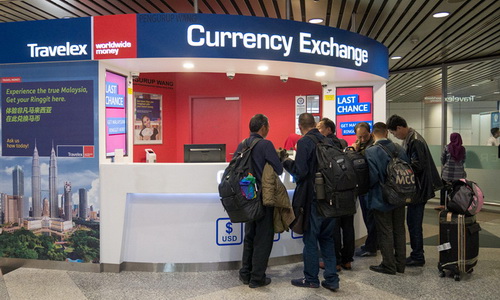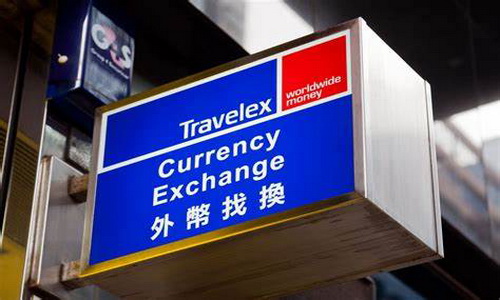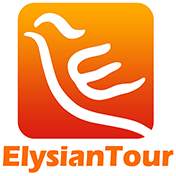Money Exchange in China
The currency of mainland China is called renminbi or yuan, or colloquially known as kuai. Equaling 10 jiao or mao (1 jiao equals 10 fen), Yuan is the basic unit of Chinese currency that is used to quote for the price of most goods. The code for the Chinese currency is RMB, CNY or a symbol ¥. The most used banknotes in China include ¥1, ¥5, ¥10, ¥20, ¥50 and ¥100.

Hong Kong, Macau and Taiwan have their different currencies, respectively Hong Kong Dollar (HKD $), Pataca (MOP $) and New Taiwan Dollar (NT $). Most shopping malls in Hong Kong and Macau also accept Chinese Yuan, and exchanging RMB is really easy and convenient, too.
In recent years, mobile payment has swept across China rapidly. Various payment methods like AliPay and WeChat Pay had been popularized everywhere including big hotels, shopping malls, small shops and even tinny street vendors. However, neither of these apps currently are available for foreign credit or debit card transactions.
Major foreign-issued credit cards such as American Express, Master Card, Visa and JCB are not yet widely accepted in China other than at some upscale hotels, restaurants, and big shopping centers. Even in big cities like Beijing and Shanghai, you need cash for taxis, convenience stores, souvenir shops, small restaurants, train tickets, admission of attractions, etc.
Note: If you intend to use your credit card in China, you'd better inform the card-issuing bank of your travel plan in case your account is blocked because of some seemingly suspicious foreign transactions.
Foreign travelers are only allowed to carry cash no more than US$5,000 (20,000 RMB) into China, otherwise a declaration would be needed. However, we do not advise you to carry such a big amount of money during a trip considering the safety.
At least, you need to have some cash for basic needs like the airport-hotel transfer, a meal or other emergencies. In China, you could easily find a good range of money exchange service via banks, airport kiosks and hotels in major Chinese cities. Each method has its merits, which will be demonstrated below.
- Airport Booth - The Fastest Way to Get RMB
- Hotels - Rather Safe and Convenient Places
- Banks - Method for the Best Exchange Rate
- Black Market - Risk of Counterfeit Bill

The easiest way to change your bills is to go to an exchange counter at the airport upon your arrival in the country. Airports in gateway cities including Beijing, Shanghai, Guangzhou and Hong Kong get money exchanging booths in service for 24 hours so that you could get money no matter how late your land. The exchange rates are pretty much the same in China, but the commission fees vary between different airports. If the fees are a bit higher, you could just exchange less cash for a taxi and other incidentals.
Many top-end hotels are available for currency exchange service. It is traditionally the most popular way for foreign travelers to get RMB without waiting in line. Though there will be a small service fee charged, the convenience is worth it. The precondition is, of course, that you need to get lodged in the hotel. Likewise, you need to present your passport for identification.
If planning to exchange a large sum of money, you are suggested to go to the bank counters where the best exchange rate with the least amount of risk is offered. The exchange service is available in most banks, such as Industria l and Commercial Bank of China, China Construction Bank, Agriculture Bank of China, and China Merchants Bank.
Among all, the Bank of China accepts most foreign currencies and provides a fair rate. Chinese banks are in service 7 days a week (foreign currency exchange service is usually only available from Monday to Friday), but sometimes they could be still very busy and you need to line up even for hours.
It's hard for you to search for a bank with a foreign exchange counter once you step out of major Chinese cities. Before venturing to smaller towns and less developed mountainous areas, you need to prepare enough RMB cash in advance.
Like the same case in other Asian countries, many foreigner-targeted restaurants and souvenir shops provide currency exchange service to alien travelers. Sometimes, you might be approached by currency speculators with bags full of cash for illegal exchanges, and they offer a rate even better than the banks. However, there is a high risk that you would get ripped off with counterfeit bills. It is absolutely not worth the hassle.

Carrying large amounts of money is kind of risky. Like most young travelers do, you could typically withdraw Chinese Yuan directly from the ATMs with your credit card. It is the quickest and easiest way to get cash. ATM is widely available in touristy areas like airport and train stations, and you could simply locate one at each street corner in urban areas.
Most ATMs affiliated with Bank of China have signage to indicate their availability for cash advance with Visa, Cirrus, Express, Master Card. They could be operated in English with exactly the same process as at your home.
The exchange rate is usually reasonable, but you might be charged a service fee both from the Chinese bank and from your own bank. Anyway, the convenience of using ATMs is definitely worth the added cost. Besides, before departure from home, you shall let your bank know your purposed use of ATM card in China so that no problem occurs during your withdrawal. In Hong Kong and Macau, nearly all banks and ATMs accept international cards, while HSBC Bank would be your best option.
Yet traveler's checks could be a secure way to carry a big amount of money into China, while they are not advisable because they can be exchanged only at some certain airports, large banks and some high-end hotels of international brands.
Another problem of exchanging the check is that you might have to queue up for long at the bank counters, which is definitely not worth the trouble. Sometimes, banks would reject your exchange of a traveler's check if they fail to verify its validity. Relatively speaking, cash is much easier to exchange than a traveler's check in China.
Note: Keep your receipts for currency exchange or withdrawal, as they are needed to convert the RMB back into foreign currency when you leaving China.









